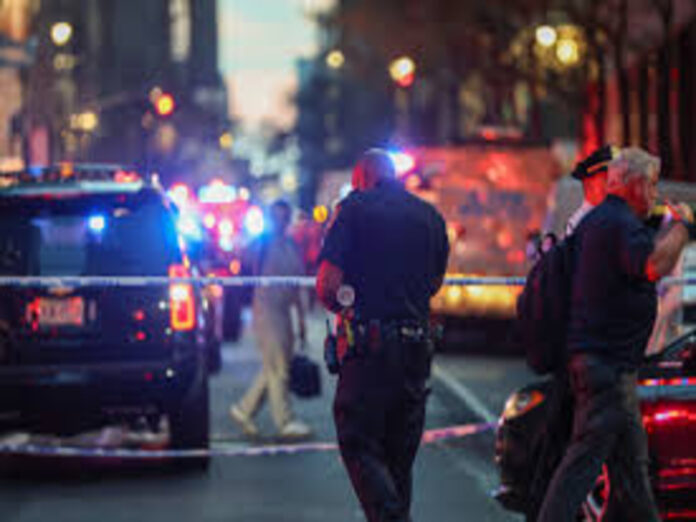Years Of Leniency, Failed Reform, & Political Hesitation Have Left Law-Abiding Americans Exposed To Rising Violence & A Leadership crisis That Puts Ideology Over Safety
Monday, October 13, 2025, 10:45 A.M. ET. 5 Minute Read, Editorial, Opinion, By Jennifer Hodges: Englebrook Independent,
WASHINGTON, DC.- This weekend, with two mass shootings taking place in Mississippi and South Carolina, across America, it’s becoming apparent that the right to live safely, the most basic promise of government, is being broken each and every day. Crime is surging in major cities, creeping into suburbs, and eroding the public’s sense of order. Yet the elected leaders entrusted with defending their citizens are often the same ones advancing or tolerating policies that make the crisis worse.
From bail reform laws that send repeat offenders back onto the streets within hours to “sanctuary” policies that shield dangerous individuals from accountability, the story is the same: leaders chose leniency over law and paid safety as the price. The result is a growing sense among ordinary Americans that their government is no longer on their side.
The Human Cost of Policy Failure;
Behind the crime statistics are names, lives cut short or shattered by violence that might have been prevented. Stories like those of Laken Riley and Iryna Zuruska have come to symbolize the anguish felt by families who believe the system failed to protect them. So too do cases such as Rachel Morin and Jocelyn Nungaray, and the tens of thousands of other Americans who have fallen victim to violent crime in recent years.
Each story is different, but the pattern is unmistakable: when repeat offenders slip through gaps in enforcement or when laws prioritize leniency over deterrence, communities pay the price. These tragedies remind us that crime policy is not an abstract debate; it is measured in lives interrupted, families broken, and trust eroded.
When Leadership Falters;
City and state leaders across the country have spent the last decade experimenting with a kind of permissive justice; eliminating cash bail, reducing sentences, and directing prosecutors to pursue fewer criminal cases in the name of “equity.” Yet these policies have often been implemented without the basic guardrails of public safety.
When violent offenders are released before trial or repeat thieves avoid prosecution, it doesn’t “fix” a broken justice system; it breaks public trust in it entirely. Communities that once thrived now live with fear. Families double-lock doors. Businesses close early. Police morale collapses under the weight of policies that punish enforcement instead of lawbreaking.
Even sanctuary city and state policies, born of moral intent, have too often created unintended harm. By limiting cooperation between local law enforcement and federal immigration authorities, these measures can allow individuals with prior criminal histories to remain undetected and unaccountable. When the pursuit of political virtue overtakes the duty to protect citizens, tragedy is only a matter of time.
The Cost of Fear;
The cost of these decisions is measured not only in crime reports but also in the transformation of daily American life. Parents fear letting their children walk to school. Elderly residents avoid public transit. Neighborhoods that once pulsed with community now live in cautious silence.
Fear has become an unspoken tax, one paid not in dollars, but in freedom.
And still, political leaders respond with talking points. Instead of owning the failures of lenient enforcement or recognizing that safety must precede reform, many double down on policies that have already proven disastrous. They talk of compassion, but there is no compassion in indifference to victims.
Accountability Without Excuse;
Public safety should not be ideological. It should not depend on the political leanings of a city council or the electoral ambitions of a prosecutor. Safety is a universal right, and restoring it requires leadership that understands enforcement is not the enemy of justice, but its foundation.
The answer is not to abandon reform altogether, but to restore balance. Fairness for the accused cannot come at the expense of protection for the innocent. Bail reform should include risk-based assessments. Sanctuary policies must distinguish between those seeking opportunity and those exploiting lawlessness. Prosecutors should be guided by prudence, not political fashion.
Above all, elected officials must stop treating crime as a public relations issue and start confronting it as the national crisis it has become.
A Nation Waiting for Courage;
America’s crisis of safety is a crisis of courage. Too many leaders fear political backlash more than they fear the consequences of inaction. They promise compassion but fail to extend it to victims. They speak of equity but ignore the injustice of unsafe neighborhoods. They invoke reform but forget that reform without accountability is chaos.
Citizens deserve better leaders who understand that justice and order are not opposites but partners. Without one, the other collapses.
The Road Back;
Restoring safety will not be easy, but it begins with a simple commitment: the law must mean something again.
- Enforce existing statutes.
- Support the police while demanding integrity.
- Stop the revolving door of repeat offenders.
- Review leniency programs that have failed to deliver real results.
Most importantly, leaders at every level must remember that their highest moral obligation is not to ideology or interest groups, but to the people who trust them with their lives.
Editor’s Note:
This op-ed draws on publicly reported crime data and documented cases of violent offenses across multiple jurisdictions. It is a call for balanced but decisive leadership, one that protects communities, respects justice, and restores the American promise of safety and security.






